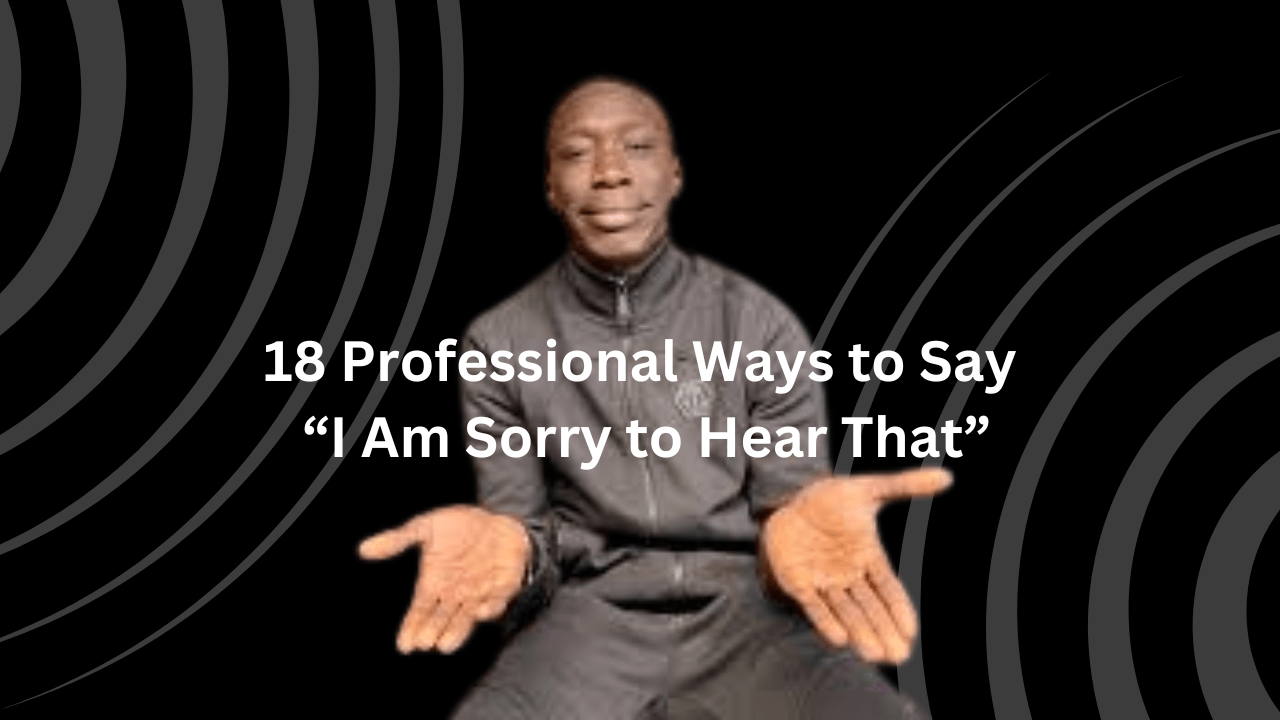Navigating the delicate terrain of responding to unfortunate news can often present a challenge in maintaining professionalism. While the instinctive response of “I am sorry to hear that” may suffice in some contexts, discerning the most appropriate and refined alternative becomes paramount in certain situations.
This discourse aims to illuminate this nuanced inquiry. Within these pages, we have curated a collection of exemplary synonyms for “I am sorry to hear that,” meticulously tailored to elevate your communicative finesse and facilitate astute decision-making in such scenarios.
Is It Professional to Say “I Am Sorry to Hear That”?

Utilizing the phrase “I am sorry to hear that” undoubtedly embodies professionalism, serving as a reliable means to express regret or offer condolences upon receiving unfavorable news from a colleague or employee.
Read this post also: 11 Other Ways to Say “Sorry for the Short Notice” in an Email
While undeniably appropriate in formal settings, this phrase may lack the warmth required to convey genuine empathy. Regrettably, it can sometimes come across as perfunctory rather than heartfelt.
To illustrate, consider the following example:
“I am sorry to hear that you are not feeling well, Marcus.”
Pros:
Suitable for formal communication channels, including emails.
Offers a straightforward apology adaptable to various circumstances.
Cons:
Tends to lack a personal touch, potentially diminishing its perceived sincerity.
Often perceived as a generic response, possibly failing to convey genuine empathy.
While “I am sorry to hear that” undeniably holds merit in professional discourse, exploring alternative expressions that blend friendliness with formality can enhance interpersonal connections. Delve further into our discussion to uncover these alternatives and enrich your communication repertoire, infusing vitality into your written exchanges.
What’s Another Way to Say “I Am Sorry to Hear That”?

- I extend my sincere apologies.
- Regrettably, it’s a lamentable situation.
- I’m filled with remorse upon hearing this.
- It’s truly disheartening; I find it difficult to believe.
- I express my heartfelt apologies.
- I deeply regret hearing this news.
- It’s a circumstance of unfortunate nature.
- What a regrettable turn of events.
- It’s a saddening development.
- It’s regrettable that such a situation has arisen.
- I sympathize deeply with your situation.
- My heart goes out to you during this challenging time.
- I share your disappointment and frustration.
- I understand how difficult this must be for you.
- Please accept my sincerest condolences.
- You have my deepest sympathies.
- You have my deepest sympathies.
- Please know that you are in my thoughts and prayers.
I extend my sincere apologies.
This phrase conveys a deep sense of remorse and accountability. “Sincere” emphasizes the authenticity of the apology, indicating genuine regret. “Apologies” acknowledges wrongdoing or a situation causing distress.
“Extend” suggests a personal and heartfelt offer of apology, making it suitable for significant errors or adverse impacts. Isn’t this better than “I Am Sorry to Hear That”
“Regrettably, it’s a lamentable situation.”
“Regrettably” expresses sorrow or disappointment, acknowledging the unfortunate circumstances. “Lamentable” denotes deep regret or pity, highlighting the situation’s unfortunate nature. Together, they convey a formal acknowledgment of distressing circumstances, suitable for professional contexts. Isn’t this better than “I Am Sorry to Hear That”
I’m filled with remorse upon hearing this.
This phrase indicates profound regret or guilt. “Remorse” signifies deep sorrow, conveying sincere empathy. The speaker is overwhelmed by emotions, showing genuine concern for those affected. Isn’t this better than “I Am Sorry to Hear That”
“It’s truly disheartening; I find it difficult to believe.”
Expresses shock and dismay, indicating genuine sadness or disappointment. “Disheartening” signifies profound disappointment, while “difficult to believe” suggests incredulity, emphasizing the emotional impact of the situation. Isn’t this better than “I Am Sorry to Hear That”
“I express my heartfelt apologies.”
Conveys genuine regret and sincerity. “Heartfelt” indicates genuine emotion, while “apologies” expresses formal acknowledgment of wrongdoing. Suitable for situations requiring genuine empathy and sincerity. Isn’t this better than “I Am Sorry to Hear That”
“I deeply regret hearing this news.”
Signifies profound sorrow or remorse upon learning of distressing news. “Deeply regret” emphasizes sincere remorse, indicating genuine empathy for those affected. Isn’t this better than “I Am Sorry to Hear That”
“It’s a circumstance of unfortunate nature.”
Conveys recognition of unfortunate circumstances. “Unfortunate” acknowledges the distressing situation’s undesirability, expressing sympathy while maintaining a formal tone. Isn’t this better than “I Am Sorry to Hear That”
“What a regrettable turn of events.”
Expresses disappointment or sorrow regarding unfolding events. “Regrettable” signifies deep disappointment or sorrow, emphasizing the unfortunate nature of the situation. Isn’t this better than “I Am Sorry to Hear That”
“It’s a saddening development.”
Indicates sadness or sorrow regarding unfolding events. “Saddening” conveys genuine empathy, acknowledging the emotional impact of the situation’s progression. Isn’t this better than “I Am Sorry to Hear That”
“It’s regrettable that such a situation has arisen.”
Acknowledges the unfortunate occurrence of the situation. “Regrettable” signifies sincere disappointment or sorrow, indicating genuine empathy while maintaining a formal tone. Isn’t this better than “I Am Sorry to Hear That”
“I sympathize deeply with your situation.”
This phrase conveys a strong sense of empathy and understanding. “Sympathize” indicates an emotional connection and shared feeling, expressing genuine concern for the recipient’s circumstances. Isn’t this better than “I Am Sorry to Hear That”
“My heart goes out to you during this challenging time.”
Expresses heartfelt support and solidarity. “My heart goes out to you” signifies genuine empathy and emotional support, offering comfort and understanding during difficult circumstances. Isn’t this better than “I Am Sorry to Hear That”
“I share your disappointment and frustration.”
Conveys a sense of shared emotions and solidarity. “Share your disappointment” indicates empathy and understanding, acknowledging the recipient’s feelings while expressing support. Isn’t this better than “I Am Sorry to Hear That”
“I understand how difficult this must be for you.”
Shows empathy and recognition of the recipient’s challenges. “Understand how difficult” signifies acknowledgment of the situation’s hardships, expressing genuine concern and support. Isn’t this better than “I Am Sorry to Hear That”
“Please accept my sincerest condolences.”
Offers formal condolences and sympathy. “Sincerest condolences” expresses genuine sorrow and sympathy, offering comfort and support during times of loss or difficulty. Isn’t this better than “I Am Sorry to Hear That”
“You have my deepest sympathies.”
Conveys heartfelt sympathy and support. “Deepest sympathies” expresses genuine empathy and understanding, offering comfort and solidarity during challenging times. Isn’t this better than “I Am Sorry to Hear That”
“I am here to offer my support in any way I can.”
Offers practical assistance and emotional support. “Offer my support” indicates willingness to help and provide assistance, expressing genuine concern and solidarity. Isn’t this better than “I Am Sorry to Hear That”
“Please know that you are in my thoughts and prayers.”
Offers spiritual support and solidarity. “In my thoughts and prayers” signifies genuine concern and support, offering comfort and solidarity through spiritual means. Isn’t this better than “I Am Sorry to Hear That”
Conclusion:
In summary, the exploration of professional alternatives to the common expression “I am sorry to hear that” underscores the significance of nuanced communication in expressing empathy and concern. By delving into various phrases such as “I extend my sincere apologies,” “Regrettably, it’s a lamentable situation,” and others, individuals are equipped with a diverse toolkit to navigate sensitive conversations with finesse and professionalism.
These alternatives not only convey genuine empathy but also demonstrate a heightened level of respect and understanding towards the recipient’s situation. By carefully selecting appropriate phrases, communicators can effectively convey their sympathy while maintaining a professional demeanor.
Moreover, the consideration of context and the emotional resonance of each phrase further emphasizes the importance of thoughtful communication in fostering positive relationships. Whether in business correspondence, personal interactions, or formal settings, the ability to articulate empathy in a professional manner can significantly enhance rapport and trust.
In essence, embracing these professional alternatives serves as a testament to one’s commitment to effective communication and empathetic engagement. Through conscious language choices, individuals can navigate sensitive conversations with tact, compassion, and professionalism, ultimately fostering stronger connections and mutual understanding in all facets of life.









